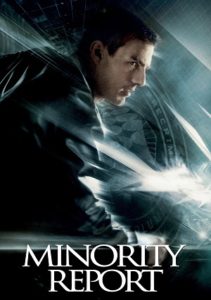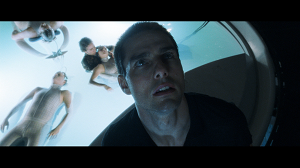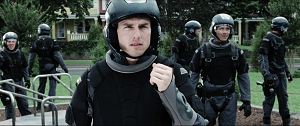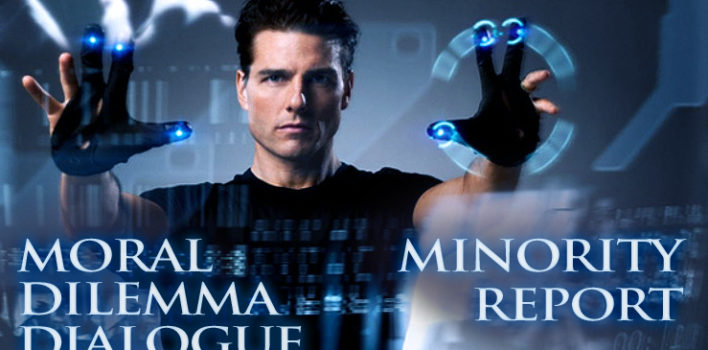Moral Dilemma Dialogue: Minority Report
In the Moral Dilemma Dialogue series, we take one film and examine a moral dilemma presented within it. Two people take opposing sides of the dilemma and argue their case. The arguments are presented sight-unseen of the opposing side’s approach, and with no rebuttal. That is where you, the audience, come in.
The Dilemma
Would knowing the future justify penalizing future crimes?
Background
 In the world of Philip K. Dick’s Minority Report, there is an entire specialized police division for “Pre-Crime.” Though we never really know where the three psychics, or “Pre-Cogs,” come from or how they attained their gifts, it is implied (at least at first) that they are always correct in their visions. The film focuses primarily on homicide or intentions of murder, and the Pre-Crime division’s intervention lead by their Chief John Anderton (Tom Cruise). Anderton is a steadfast believer in the intentions of his division, but when the Pre-Cogs predict that he will commit a murder within 36 hours, his world is thrown into turmoil. His quest to discover whether the prediction is true presents us with an interesting dilemma; if you can know about future crimes, does that justify penalizing them before they could occur?
In the world of Philip K. Dick’s Minority Report, there is an entire specialized police division for “Pre-Crime.” Though we never really know where the three psychics, or “Pre-Cogs,” come from or how they attained their gifts, it is implied (at least at first) that they are always correct in their visions. The film focuses primarily on homicide or intentions of murder, and the Pre-Crime division’s intervention lead by their Chief John Anderton (Tom Cruise). Anderton is a steadfast believer in the intentions of his division, but when the Pre-Cogs predict that he will commit a murder within 36 hours, his world is thrown into turmoil. His quest to discover whether the prediction is true presents us with an interesting dilemma; if you can know about future crimes, does that justify penalizing them before they could occur?
Jonathan Sprang and Alexis Johnson submit themselves to this dilemma for your consideration. They both present opposing sides to this dilemma, and for this segment of the Moral Dilemma Dialogue they will each be giving a Christian perspective. While they are both presenting their argument to the best of their abilities, they are doing so to get a conversation going. They each may actually hold different opinions in real life. We welcome your critique, questions, and of course your own perspective as well!
Perspective One: Alexis, Christian argument that knowing the future DOES justify penalizing future crimes
It seems illogical to punish a crime that has not yet been committed, but as Christians we know that our sins and crimes go far beyond physical actions or spoken words. They happen deep within the darkest parts of us.
1 John 3:15 states, Everyone who hates his brother is a murderer, and you know that no murderer has eternal life abiding in him.
In Matthew 5:27-28, Jesus echoes something similar, You have heard that it was said, ‘You shall not commit adultery.’ But I say to you that everyone who looks at a woman with lustful intent has already committed adultery with her in his heart.
 It is very clear that sin isn’t merely doing something wrong, it comes also in thinking, feeling, and even our very being. God is omnipotent. He sees all things and knows all of our sins before we even commit them. When put in those terms, we can see how there is indeed a moral justification for punishing crimes at their conception, not just their execution. Just as a human being is alive at conception, so is sin alive at its conception in our hearts or minds. It doesn’t just suddenly become sin once it comes out into the world.
It is very clear that sin isn’t merely doing something wrong, it comes also in thinking, feeling, and even our very being. God is omnipotent. He sees all things and knows all of our sins before we even commit them. When put in those terms, we can see how there is indeed a moral justification for punishing crimes at their conception, not just their execution. Just as a human being is alive at conception, so is sin alive at its conception in our hearts or minds. It doesn’t just suddenly become sin once it comes out into the world.
“What comes out of a person is what defiles him. For from within, out of the heart of man, come evil thoughts, sexual immorality, theft, murder, adultery, coveting, wickedness, deceit, sensuality, envy, slander, pride, foolishness. All these evil things come from within, and they defile a person.” (Mark 7:20-23)
Yet, there is a catch to this point I’m making and we’ll circle back to that shortly.
In the first act of the film, John Anderton and his team apprehend a man named Howard Marks after the precogs have their vision. They see him murdering his wife and her lover after catching them in an affair. It’s a very sad scene. Marks appears to be a good husband and father, and you can practically see the adultery ripping his heart in two. Though John and his team stop the murders in time, Marks claims he wasn’t going to hurt them. We don’t know for certain what he might have done, but he is arrested and “haloed” (imprisoned and forcefully stripped of his own will) for a crime that, at least on the surface, he did not yet commit.
As Christians we know we are accountable for all our sins, and as scripture tells us, sins are not just what we do, they happen from the inside out. However, we also know that there is grace for our failings. The precrime division in Minority Report makes things very black and white. You can be arrested and haloed for your crimes without trial or defense. It’s a legalistic system with no real room for grace or redemption.
The CBS television series Person of Interest has a very similar concept to Minority Report in that a team of people work together stop homicides from taking place. Instead of precogs, they use an artificial intelligence called “The Machine” that, through analyzing global surveillance, is able to gather evidence to predict violent crime. The narrative in POI supports the belief that stopping crime before it happens is a good thing, and should be implemented for the saving of lives, but the system cannot function without grace. The team in POI is not jury, judge, and executioner, the way the team in MR functions.
 By the end of MR, the characters come to see the flaws in their system, and all those haloed are set free. However, that doesn’t mean intervening is wrong. Because sin starts in the heart, I would argue that stopping it before it grows and festers into greater sin is justified. If your right eye causes you to sin, tear it out and throw it away. For it is better that you lose one of your members than that your whole body be thrown into hell. (Matthew 5:29) It would be foolish not to intervene if we possibly can, but the system in place to make such judgements has to have equal justice for both the victim and the perpetrator. For the sun rises on both the evil and the good, and the rain falls on both the righteous and the unrighteous, (Matthew 5:45).
By the end of MR, the characters come to see the flaws in their system, and all those haloed are set free. However, that doesn’t mean intervening is wrong. Because sin starts in the heart, I would argue that stopping it before it grows and festers into greater sin is justified. If your right eye causes you to sin, tear it out and throw it away. For it is better that you lose one of your members than that your whole body be thrown into hell. (Matthew 5:29) It would be foolish not to intervene if we possibly can, but the system in place to make such judgements has to have equal justice for both the victim and the perpetrator. For the sun rises on both the evil and the good, and the rain falls on both the righteous and the unrighteous, (Matthew 5:45).
Circling back to the catch I mentioned…Though we’ve greatly sinned inside, outside, and by omission, there is grace and redemption to be found from all our sins. The crimes of our future have already been punished. In His own way, God pulled the biggest precrime intervention of all time by sending His Son to die for our sins of the past, present, and those yet to come. Someone had to pay, and in the greatest act of love and mercy, Someone already did.
Perspective Two: Jonathan, Christian argument that knowing the future DOES NOT justify penalizing future crimes
Sci-fi and fantasy have a long history of playing out scenarios that sound like a good idea in the real world. They test the pros and cons within the fiction to help us process if this something we should consider. Most of the time, the premise is one that sounds like a smart idea, it sounds good and right, and you’d think it would lead to a flourishing society. The story following then deconstructs that idea to reveal its flaws and ultimately to reveal that it’s not as good as we’d hoped.
This is the conclusion of the movie, Minority Report. Being able to see crimes before they happen sounds like a very good thing for a society, and it was. Crime is virtually eliminated from the city because they can see the who’s and what’s and arrest them using the help of 3 “Pre-Cogs.” They have a vision of the future, display it for the Pre-Crime team to arrest the pre-culprit, and convict them for the crime they were “going to” commit. But by the end of the movie we are filled in that the Pre-Cogs are not always right, and in essence the future is not as hard and set as they once thought.
 The choice this fictional government is making to use the Pre-Cogs to make arrests for future crimes reveals to us that they lean toward judgement, as opposed to mercy. If the future isn’t set in stone, then there’s always a chance that while the future was seen, it could still change. And who gets to make the call on whether to pursue a case or not? Who do you give that authority too? And do you want someone who leans toward judgement or mercy?
The choice this fictional government is making to use the Pre-Cogs to make arrests for future crimes reveals to us that they lean toward judgement, as opposed to mercy. If the future isn’t set in stone, then there’s always a chance that while the future was seen, it could still change. And who gets to make the call on whether to pursue a case or not? Who do you give that authority too? And do you want someone who leans toward judgement or mercy?
If there’s anyone who has the right or authority to make those decisions it’s God. God created, God can take away. God is holy and just. But what happens in scripture when God makes plans to kill people?
When the Israelites are wandering in the desert before entering the Promised Land, they complained an awful lot. Then, while Moses was on Mt. Sinai receiving the Law from God, the Israelites build a Golden Calf to worship. This was the last straw for God, who planned on murdering them all and starting over.
Then the Lord said, “I have seen how stubborn and rebellious these people are. Now leave me alone so my fierce anger can blaze against them, and I will destroy them. Then I will make you, Moses, into a great nation. (Exodus 32:9-10, NLT)
Moses talks to God. Reminds God of God’s promises, and God changes God’s mind.
“Turn away from your fierce anger. Change your mind about this terrible disaster you have threatened against your people!”… So the Lord changed his mind about the terrible disaster he had threatened to bring on his people.” (Exodus 32:12c, 14, NLT)
God planned to commit genocide. Moses changed God’s mind. The Pre-Cog division would never have given God that chance, the Pre-Crime team would storm in and arrest God without question. And probably sentence God to death…
What’s really interesting about this passage is the word that is translated “changed his mind” is the Hebrew word shuv. It literally means to “turn around and go the other direction.” If that sounds familiar, it should. In most places this word is used, it’s translated repent. “So the Lord repents…” Moses appeals to God’s mercy and God repents.
Jonah knows that God leans towards mercy over judgement which is why Jonah didn’t want to preach to Ninevah. He knew that God’s judgement could lead to mercy, and Jonah didn’t want mercy for his enemies. He wanted them dead. Turns out Jonah was right, and God forgave the Ninevites for their evil.
 So if we must have grace enough to allow God to change God’s mind, then how much more should we have grace for humans to change theirs? The Pre-Cog crime division would crucify even God. They remove the opportunity to appeal to mercy. When our policies set us so completely against the way of Jesus (mercy trumps Judgment), then something is wrong.
So if we must have grace enough to allow God to change God’s mind, then how much more should we have grace for humans to change theirs? The Pre-Cog crime division would crucify even God. They remove the opportunity to appeal to mercy. When our policies set us so completely against the way of Jesus (mercy trumps Judgment), then something is wrong.
The action itself is the crime. Up until the crime happens, there is still a chance they could change their mind. It may be in the car in front of the bank, it may be when they have the jimmy stick in the car window, or the gun pointed at the person they were planning to kill. There’s always a chance they could turn around. There’s always a chance they could repent. And that holds an enormous amount of hope. To remove that hope, to remove the opportunity for someone to repent is sin.
Conclusion
This is where the dialogue part comes in. Where do you fall on this dilemma? Are Alexis’ points persuasive enough to trust in an ability to know the future, and act in judgment of it? Or are Jonathan’s points stronger, that allowances for repentance should be made and the crime not punishable until it actually happens? Please vote in the poll, and let your voice be heard by commenting below!







